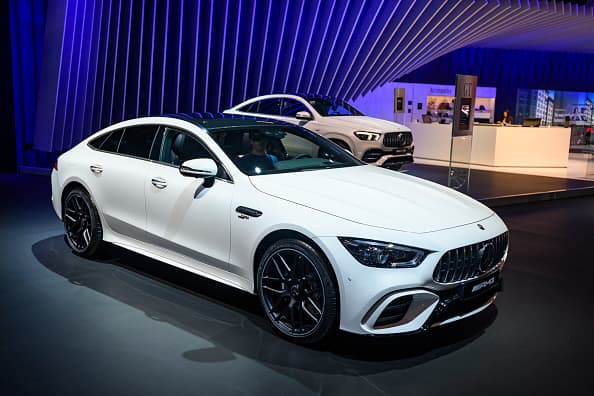
Mercedes-AMG GT 43 4MATIC+ on display at Brussels Expo on January 9, 2020 in Brussels, Belgium. Sjoerd Van Der Wal | Getty Images News | Getty Images
Mercedes-Benz shares gained around 5% on Thursday after the German carmaker beat fourth-quarter earnings expectations and announced a new share buyback program, despite warning of “exceptional” risks in the year ahead.
Fourth-quarter earnings before interest and taxation (EBIT) came in at 4.33 billion euros ($4.7 billion), slightly ahead of consensus expectations, taking the full-year figure to 19.66 billion euros. Revenues rose 2% in 2023 to 153.2 billion euros from 150 billion the previous year.
The group also announced an additional share buyback program worth up to 3 billion euros, with the repurchased shares subsequently canceled.
However, Mercedes-Benz warned that supply chain bottlenecks for critical components remain a “significant risk factor,” and said an “exceptional degree of uncertainty” surrounds geopolitical events and trade policy, particularly in the form of the Russia-Ukraine and Middle East conflicts and tensions between Western powers and China.
The company sees flat growth in 2024 as inflation and supply chain costs bite, while adjusted return on sales for Mercedes-Benz Cars is expected to slip to a range of 10% to 12% from 12-14% in 2023.
Automotive analysts at Jefferies said in a reactive note Thursday that although there were no major surprises in the earnings, the cash return policy was “a sign of confidence and consistent with the premium/luxury positioning, with buyback set to keep EPS (earnings per share) growing.”
Mercedes-Benz Chairman Ola Källenius told CNBC on Thursday that the company was well positioned to overcome the various macroeconomic headwinds.
“Today we're presenting very strong numbers for Mercedes-Benz Cars, and really a standout year for our light commercial van division,” he said.
Revenue at Mercedes-Benz Vans rose by 18% year-on-year to 20.3 billion euros and adjusted EBIT surged 59% to 3.1 billion euros, while unit sales climbed 8% to a record 447,800 units.
Yet Källenius noted that supply constraints did impact the company in the second half of 2023 and will continue to do so in the first quarter of 2024.
“But we are working through that with our partner, we are now putting more capacity in that has been prepared over the last months, so during this first quarter and towards the end of it, I think we will have worked through those issues, so that in the second quarter we can come back to a more normal supply situation,” he added.
Although he acknowledged that the macroeconomic environment was “challenging” against a backdrop of escalating conflict and geopolitical tensions, along with persistent high interest rates and structural economic headwinds in China, Källenius said Mercedes would not be scaling back its investments in future development.
“That doesn't mean though that we're retreating from any one market, we always try to exploit the maximum potential for us in the more than 150 countries that we're active in,” he told CNBC's Annette Weisbach, adding that the company was not “peeling back” its investments either.
“In fact, we're actually in the highest level of investment in the history of the company, readying a whole new generation of products — some of which will be launched this year, but really a product offensive especially on the battery electric vehicle side that starts in 2025, goes through 2026 and beyond,” Källenius said.
“So we are full speed ahead in terms of developing new technologies, innovations and a broad set of products for the years to come.”
News Related